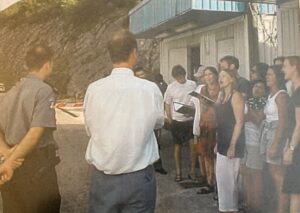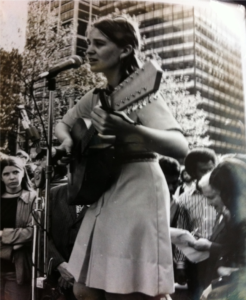This blog was written by Laura Hassler, Director Musicians Without Borders
A couple of our readers, good friends and supporters of MWB, reacted with surprise and even anger to my recent blog piece.
I had written about joining a human rights demonstration in the Dutch capital, the Hague, in support of Extinction Rebellion activists blocking a highway to demand government accountability on fossil fuels. I wrote about the interrelationship of the climate crisis, the social narrative of fear of ‘the other’ and the politics of war.
These days, there is a hip word for that: intersectionality.
Many years ago, when I was a university student, my father was a leader in the US peace movement. On a ‘fact-finding mission’ to Vietnam in the 1960s, he met the Vietnamese Buddhist monk and peace movement leader, Thich Nhat Hanh. Al Hassler and Thich Nhat Hanh would become not only collaborators in many initiatives to stop the Vietnam war and rescue its victims, but also close personal friends.
In 1971, while that war was still raging, they did something extraordinary: they organized a climate conference, an independent gathering of scientists in parallel to the first UN conference on the environment in Stockholm. Two peace leaders, experts on nonviolence, resistance, anti-war organizing, brought scientists together to discuss threats to biodiversity, water supplies and ecosystems. Why a conference on the environment?
Because, even when there was not a name for it, they understood the principle of intersectionality. They understood that war and social injustice were connected to environmental injustice, that care for the lives of human beings was inexorably interwoven with care for all living things. They understood that the immediate need to end the latest of so many devastating wars was coupled to a long-term imperative to end environmental injustice, because peace on earth depends on caring for the earth. They understood that future wars would develop out of struggles for water, food and natural resources, and would be followed by streams of refugees. They understood that peace on the planet depends on healthy relationships with each other and with our separate and shared environments.
I am a musician and an activist and these strands have always been interwoven, from singing at anti-Vietnam-war demonstrations to creating intercultural music groups to founding Musicians Without Borders. Today, decades after the war in Vietnam, with no end to forever-wars in sight, I look for signs of hope. And I find them in young climate activists.
 A newly formed Musicians Without Borders in 2000,
A newly formed Musicians Without Borders in 2000,
literally singing our way across the Croatian border.
Here are young people who are standing for the rights of all living beings, for the need to share space equitably on our one-and-only shared planet. Here are people who act fearlessly and non-violently, risking their own safety, willing to be beaten and sprayed with water cannons or to go to jail for their principles. Here are people who take care of each other and build community– from local to global, who see the interrelationships between social justice, climate justice, war and peace. I see my father in them, I see Thich Nhat Hanh, and I see my young self.
 Laura Hassler singing at an anti-war demonstration, ca.1970.
Laura Hassler singing at an anti-war demonstration, ca.1970.
They sing all the time– singing is part of their shared culture, just as it was in our peace movement during the Vietnam war. At the recent demonstration in the Hague, on March 11, a 60-piece classical orchestra joined in solidarity and played Beethoven on the highway. A choir sang ‘The Earth is our Mother, we must take care of her’. Someone held a banner that read ‘Music Declares Emergency’, and I unfurled my own banner: ‘Musicians Without Borders’.
Let’s not draw lines, but work together for the changes that are so urgently needed.
That doesn’t mean abandoning our own fields of expertise—Musicians Without Borders will continue to use the power of music for healing, connection and empowerment with people affected by war and armed conflict. But we can also understand, endorse and support related struggles for social justice, including climate justice.
In the worldwide struggle for meaningful social change, ‘they are few and we are many’ only works if we work together. Activists for climate, peace and social justice have a common bond. And we musicians can continue to connect, build community and empower young people through the power of music, while also raising voices for climate justice, social equity and peace. But only if we understand that our goals are interconnected.
Intersectional.
An orchestra performs Beethoven’s Symphony no.7 during an Anti-Fossil Fuels Subsidies demonstration, March 11, 2023.
Video created and used with kind permission by Extinction Rebellion NL.
PS: Thanks to both critical readers for being open to conversation!






